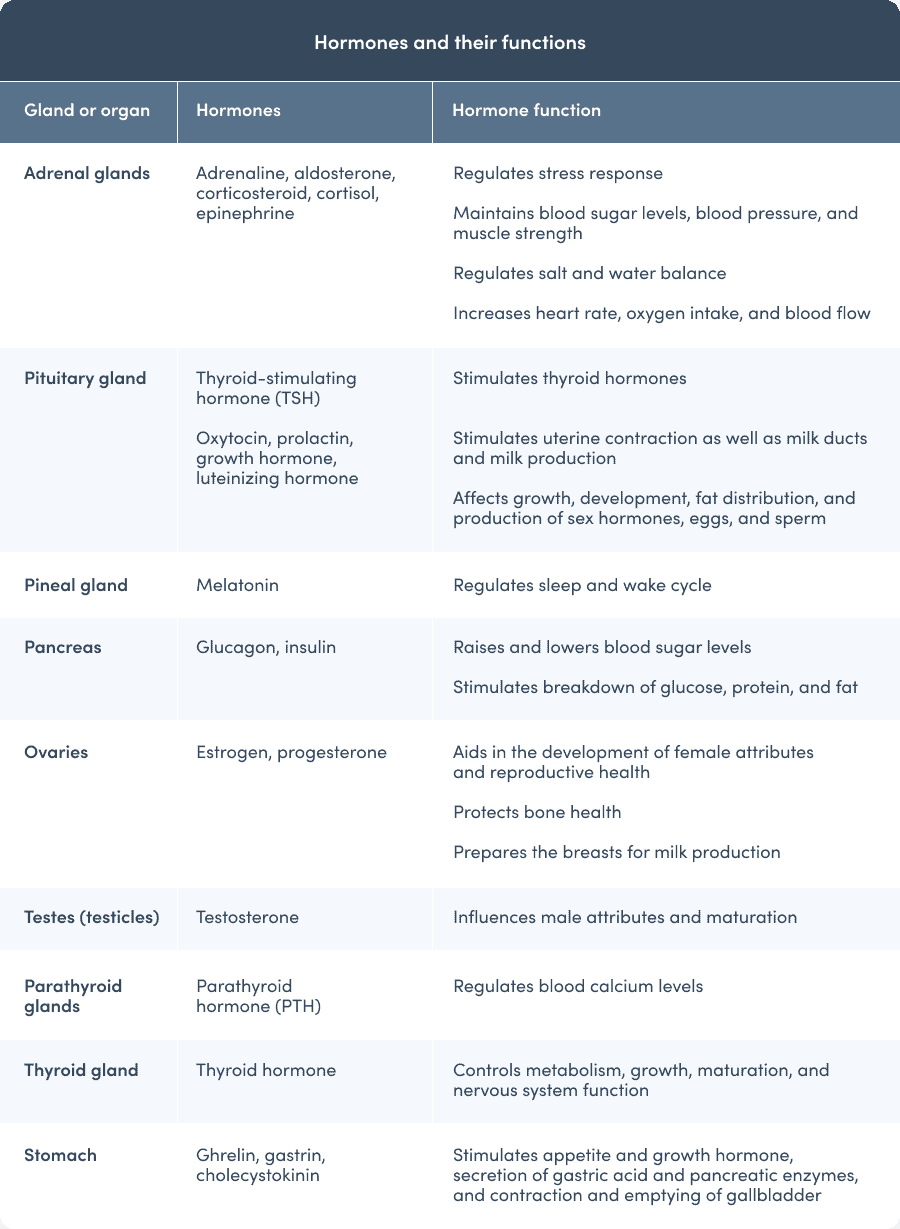We often talk about hormones causing different changes in our bodies, but what are hormones and how do they function? To put it simply, hormones are produced by the endocrine glands and carried through the bloodstream to other parts of the body to deliver chemical messages. There are stress hormones, pregnancy hormones, thyroid hormones, peptide hormones, and others that carry their specific messages and help the human body function properly throughout the life cycle.
Hormonal systems must be well regulated or a person may experience hormonal imbalance symptoms. Individuals, whether male or female, will each experience these symptoms differently. Let’s explore the amazing hormonal system, some signs of hormonal imbalance, and supplements to balance hormones.
In this article, you’ll learn what hormones do and how to balance hormones.
 Some of the glands outlined in this table produce additional hormones, and other organs and glands also produce hormones. The role of many hormones overlap, yet each hormone is necessary for that function. (4)(21)
There are other groups of hormones. Pituitary hormones, produced by the “master” pituitary gland, play a role in growth and reproductive function and control other hormone-producing glands and organs. Thyroid hormones regulate metabolism, heart rate, muscle function, and development of the brain and contribute to bone health maintenance. (5)(21)
There are specialty hormones, like pregnancy hormones. Estrogen, progesterone, human placental lactogen, and human chorionic gonadotropin hormone all help produce and maintain a healthy pregnancy. (21)
Some of the glands outlined in this table produce additional hormones, and other organs and glands also produce hormones. The role of many hormones overlap, yet each hormone is necessary for that function. (4)(21)
There are other groups of hormones. Pituitary hormones, produced by the “master” pituitary gland, play a role in growth and reproductive function and control other hormone-producing glands and organs. Thyroid hormones regulate metabolism, heart rate, muscle function, and development of the brain and contribute to bone health maintenance. (5)(21)
There are specialty hormones, like pregnancy hormones. Estrogen, progesterone, human placental lactogen, and human chorionic gonadotropin hormone all help produce and maintain a healthy pregnancy. (21)
What do hormones do?
You’re sitting at the table and there’s lots of food. You want to eat everything in sight, but you know you shouldn’t. Neither your mother nor your doctor is there to tell you when to stop. What else can signal to you that you’ve had enough? The answer of course is hormones. In this example, ghrelin is a digestive hormone that controls appetite. Hormones also regulate many other body functions. The endocrine system is responsible for hormone production and is comprised of different organs and glands that produce and secrete all the hormones your body needs. From these glands, hormones are delivered to different organs and tissues in the body via the bloodstream. Hormones are produced in the adrenal glands, pituitary glands, pancreas, ovaries, and other parts of the body and control everything from blood sugar levels, blood pressure, sleep, inflammation, metabolism, growth, and more. (4) Women are intimately familiar with their monthly hormonal cycle which controls not just menstruation but also the related functions such as sex drive and reproduction. (22) Hormonal levels in one body system can have an effect on other body systems. We’ll discuss that in more detail when we look at the signs of hormonal imbalance. The table below provides an overview of the various hormones, where they are produced, and the messages they send in your body. Some of the glands outlined in this table produce additional hormones, and other organs and glands also produce hormones. The role of many hormones overlap, yet each hormone is necessary for that function. (4)(21)
There are other groups of hormones. Pituitary hormones, produced by the “master” pituitary gland, play a role in growth and reproductive function and control other hormone-producing glands and organs. Thyroid hormones regulate metabolism, heart rate, muscle function, and development of the brain and contribute to bone health maintenance. (5)(21)
There are specialty hormones, like pregnancy hormones. Estrogen, progesterone, human placental lactogen, and human chorionic gonadotropin hormone all help produce and maintain a healthy pregnancy. (21)
Some of the glands outlined in this table produce additional hormones, and other organs and glands also produce hormones. The role of many hormones overlap, yet each hormone is necessary for that function. (4)(21)
There are other groups of hormones. Pituitary hormones, produced by the “master” pituitary gland, play a role in growth and reproductive function and control other hormone-producing glands and organs. Thyroid hormones regulate metabolism, heart rate, muscle function, and development of the brain and contribute to bone health maintenance. (5)(21)
There are specialty hormones, like pregnancy hormones. Estrogen, progesterone, human placental lactogen, and human chorionic gonadotropin hormone all help produce and maintain a healthy pregnancy. (21)
Signs of hormonal imbalance
Hormones must be in precise balance for optimal function. If one hormone is off balance, all the others can be affected. Some signs of hormonal imbalance or dysfunction include:- Acne and/or oily skin (7)
- Change in sex drive
- Changes in appetite (26)
- Fatigue
- Headaches, including migraines
- Increased sensitivity to heat and cold
- Infertility
- Inflammation
- Menstrual changes
- Mood swings, anxiety, and depression
- Pain or swelling in joints
- Premenstrual syndrome (PMS)
- Stress
- Weight loss or gain (10)(11)(13)(14)
How to balance hormones
Hormonal imbalance has become more prevalent today because of the choices many of us make, reflecting our fast-paced, modern lifestyle. In addition, as people age, certain hormones decline naturally, which may cause hormones to fall out of balance. However, a nutritious diet, lifestyle changes, and certain supplements can help improve hormonal health so that you stay healthy and continue to feel your best.Engage in physical exercise
One of the simplest ways to balance hormonal health is to engage in regular physical exercise. Exercise has been found to control insulin sensitivity, reduce inflammation, and regulate metabolism. (2) Activity can also boost levels of testosterone, dehydroepiandrosterone (DHEA), and growth hormones. (17)(20) Daily walks have also had other positive benefits such as improvement in skeletal muscle mass, especially in older people. (25)Eat a balanced diet
Increasing protein intake and limiting sugar and refined carbohydrates can optimize hormone function. Eating protein can decrease levels of ghrelin, the “hunger hormone,” whereas large amounts of carbohydrates and sugar can increase levels of insulin. Both of these can also affect weight gain or loss and the resulting hormonal changes. (12) It is also important not to eat too much or too little. Much of the metabolic and digestive system is dependent on hormone production. Consuming too much or too little can cause damage to the hormonal system, such as insulin resistance in fat cells or overproduction of cortisol. (6)(23) Consuming a variety of fruits and vegetables and high-quality sources of protein can be beneficial for hormonal health. These food groups can help trigger a healthy gastric hormonal response, making you feel fuller faster and for a longer time. (3)(19)Manage stress
Managing stress can help balance hormones. The stress hormones cortisol and adrenaline play a necessary role in the stress response, which is evoked when a person faces immediate dangers such as wild animals or other perceived threats. Our high-stress lives today often cause chronically elevated levels of the stress hormones, which can contribute to high blood pressure, anxiety, rapid heart rate, and overeating. On the other hand, managing stress, whether by listening to calming music, getting a massage, and practicing meditation and deep breathing can help lower stress levels and keep these and other hormones balanced. (1)(24)Consider supplements
Natural supplements can also be helpful when it comes to balancing hormones.- Green tea has many health benefits, and research suggests that it may increase insulin sensitivity, lower insulin levels, lower blood pressure, and reduce inflammation and oxidative stress. (1)
- Omega-3 fatty acids and other healthy fats can have positive effects on insulin resistance. (18)
- Probiotics, which support the gut flora or good bacteria in the digestive tract, play an important role in digestion and metabolism, as well as reduce inflammation. (9)
- Vitamin B6 and magnesium work well together to reduce stress and improve symptoms of PMS, among other benefits. (8)
- Vitamin C is involved in the production of cortisol, and a study on rats suggests that this nutrient becomes depleted in times of high stress. (15)

